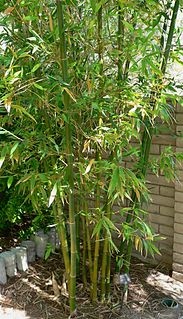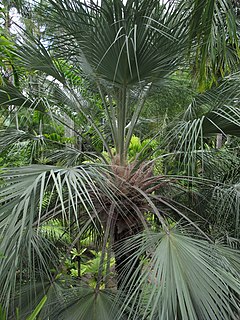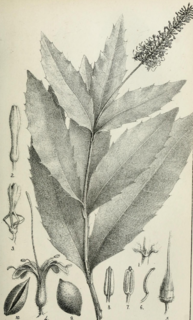
Bambusa is a large genus of clumping bamboos. Most species of Bambusa are rather large, with numerous branches emerging from the nodes, and one or two much larger than the rest. The branches can be as long as 11 m (35 ft).

Floydia is a monotypic species of tree in the family Proteaceae native to Australia. It is a somewhat rare tree found only growing in the rainforests of southeastern Queensland and northern New South Wales. The sole species is Floydia praealta which is commonly known as the ball nut or possum nut.

Banksia oreophila, commonly known as the western mountain banksia or mountain banksia, is a species of shrub that is endemic to the south-west of Western Australia. It has glabrous stems, wedge-shaped or narrow egg-shaped leaves with the narrower end towards the base, cylindrical spikes of pale pink to mauve flowers and later, up to twenty follicles in each spike, surrounded by the remains of the flowers. It occurs on slopes and hilltops in the Stirling and Barren Ranges.

Banksia blechnifolia is a species of flowering plant in the genus Banksia found in Western Australia. It was first described by Victorian state botanist Ferdinand von Mueller in 1864, and no subspecies are recognised. It gained its specific name as its leaves are reminiscent of a fern (Blechnum). B. blechnifolia is one of several closely related species that grow as prostrate shrubs, with horizontal stems and leathery, upright leaves. The red-brown flower spikes, known as inflorescences, are up to 20 centimetres (8 in) high and appear from September to November in the Australian spring. As the spikes age, each turns grey and develops as many as 25 woody seed pods, known as follicles.

Bambusa vulgaris, common bamboo, is an open-clump type bamboo species. It is native to Indochina and to the province of Yunnan in southern China, but it has been widely cultivated in many other places and has become naturalized in several regions. Among bamboo species, it is one of the largest and most easily recognized.

Bauera sessiliflora, also known as Grampians bauera, is a scrambling shrub that is endemic to the Grampians region in Australia.

Livistona alfredii, the millstream palm or millstream fan palm, is a species of flowering plant in the family Arecaceae. It is found only in the north-west of Western Australia where it is threatened by habitat loss.

Grevillea treueriana, also known as Mount Finke grevillea, is a shrub that is endemic to Mount Finke in South Australia. It is listed as vulnerable under the EPBC Act.
Hollandaea is a genus of four species known to science, of Australian rainforest trees, constituting part of the plant family Proteaceae.

Carnarvonia is a flowering plant genus of a single species, commonly named red oak or red silky oak and constituting part of the plant family Proteaceae. The single species named Carnarvonia araliifolia grows to large trees of 30 m (100 ft) or more. They grow naturally only (endemic) to the Wet Tropics rainforests region of north-eastern Queensland, Australia. The species has two described varieties, C. araliifolia var. araliifolia and C. araliifolia var. montana, and the common names are used for both.
Hollandaea sayeriana, sometimes named Sayer's silky oak, is a small species of Australian rainforest trees in the plant family Proteaceae.

Persoonia acicularis is a species of flowering plant in the family Proteaceae and is endemic to the west coast of Western Australia. It is a shrub with linear, sharply-pointed leaves and yellow flowers in groups of up to eighty.

Nymphoides crenata, commonly known as wavy marshwort, is an aquatic perennial herb of the family Menyanthaceae endemic to Australia, found in all mainland states and the Northern Territory
Bambusa basihirsuta is a species of Bambusa bamboo.

Macadamia ternifolia is a tree in the flowering plant family Proteaceae, native to Queensland in Australia, and is listed as vulnerable under the EPBC Act.

Leucopogon plumuliflorus is a shrub in the family Ericaceae. It is endemic to Western Australia.

Swainsona procumbens is a plant in the pea family (Fabaceae) native to Australia and found in New South Wales, Victoria, Queensland and South Australia.

Dampiera candicans is a plant in the family Goodeniaceae, native to Western Australia and the Northern Territory.

Dicrastylis beveridgei is a species of plant within the genus, Dicrastylis, in the family Lamiaceae. It is found in Western Australia, the Northern Territory, and South Australia.

Dicrastylis doranii is a species of plant within the genus, Dicrastylis, in the family Lamiaceae. It is found in Western Australia, the Northern Territory, and South Australia.
















